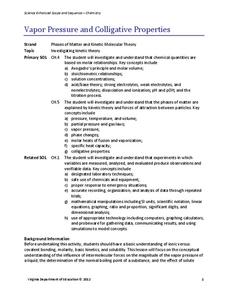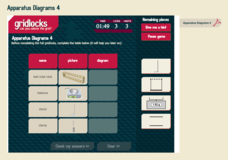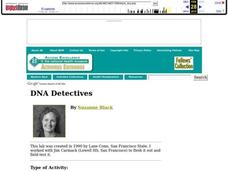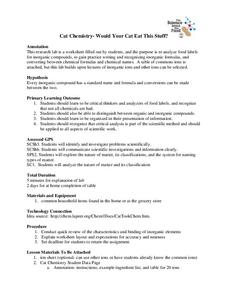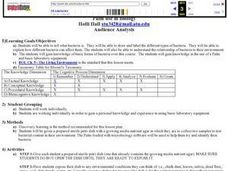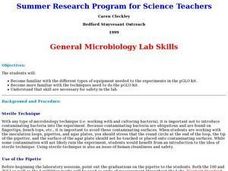Curated OER
It All Starts With a Seed
Middle schoolers use laboratory equipment safely. They identify structures in a seed. They distinguish between monocots and dicots. They search for information using the computer.
University of Minnesota
Dendritic Spines Lab
This is your brain on drugs ... literally! Your neuroscientists-in-training examine the evidence of drug use on the human brain and how neurons change their connectivity when altered by drugs. They then work together to create testing...
Cornell University
Exploring Rocks and Minerals
Investigate the properties of rocks and minerals through a rockin' hands-on activity. Learners test rocks for various properties and, using a guide, attempt to identify different samples. They use various properties including hardness,...
Curated OER
Microbiology Lab Safety
In this biology worksheet, high schoolers are introduced to the practices of safety as related to using a laboratory and then answer some questions as an assessment.
University of Georgia
Antacid and Uncle Heartburn
Household materials can be used for more than cleaning! In this collaborative experiment, emerging chemists use products such as vinegar and liquid antacid to explore chemical reactions that commonly occur in the human body.
Virginia Department of Education
Safety and the Material Safety Data Sheet
While many chemicals are used in biology class, many pupils don't understand the material safety data sheets. The lesson explains each part and the importance of understanding the forms. Young scientists use safety equipment to ensure...
Curated OER
What are Metamorphic Rocks and How are They Formed?
Even though the student handouts are not included in the write-up, this lesson plan contains the instructions for terrific activities to use when teaching middle schoolers about metamorphic rocks. First, they compare granite to gneiss...
Curated OER
Freshwater Fish Anatomy & Taxonomy
Tenth graders use a classification key to identify organisms. For this classification lesson students identify freshwater species of fish and document their observations.
Curated OER
Semipermeable Membranes and Bioaccumulation
Beginning biologists place a drop of food coloring into water of differing temperatures to observe the effect on the diffusion rate. They remove the shells from raw eggs and then experiment with osmosis over the remaining membranes....
Virginia Department of Education
Vapor Pressure and Colligative Properties
Hate to vacuum, but enjoy using a vacuum pump? Explore a lesson that starts with a demonstration of boiling water at various temperatures by using a vacuum pump. Then scholars design their own experiments to measure vapor pressure and...
Virginia Department of Education
Solution Concentrations
What happens when you combine 6.022 times 10 to the 23 piles of dirt into one? You make a mountain out of a mole hill. Scholars use dehydration to obtain percent composition and then calculate the molarity of the original solution.
Virginia Department of Education
Aspirin Analysis
Laughter may be the best medicine, but aspirin is also important. Young chemists analyze aspirin tablets using titration in this lab experiment. They then repeat the entire experiment using a different aspirin brand.
Royal Society of Chemistry
Apparatus Diagrams 4
Lab tools are cool! But, which one is the right tool for the job? Young scientists participate in a series of puzzles focused around some common lab equipment. Each puzzle requires learners to associate the tool with its image and a...
Nuffield Foundation
Investigating the Effect of Concentration of Blackcurrant Squash on Osmosis in Chipped Potatoes
Model and explore osmosis using squash and potatoes. Young scientists expose chunks of potatoes to different concentrations of a squash solution. They compare the weights of the chunks before and after exposure to the solution and use...
Curated OER
Dinosaur and DNA Days
Biology stars extract DNA samples from beef thymus and then examine its properties. They use enzymes to digest the DNA samples, and then use electrophoresis to separate fragments. Finally, they discuss methods and principles of...
Curated OER
Types of Bonding Lab
Chemistry lab learners experiment to identify a series of unknown compounds. They choose which tests to perform, but you may suggest melting or boiling point, solubility, electrical conductivity, and malleability. This is a terrific...
Curated OER
DNA Detectives
In order to understand DNA fingerprinting, advanced biology aces divise a crime scenario and analyze three different samples of lambda DNA. This creative lesson plan provides practice with micropipettes, electrophoresis boxes, and other...
University of Georgia
Would Your Cat Eat This Stuff?
Processed foods use inorganic compounds for flavoring and preservation. This take-home laboratory challenges scholars to find 20 different compounds identified on the labels of foods to list on their data collection sheet. The activity...
Virginia Department of Education
The Germ Theory and Koch’s Postulates
Explore the history of cholera and its effect on society with your biology class. Young biologists will then proceed to grow their own germs, prepared from live cultures, and follow the steps of the scientific method to generate data....
American Chemical Society
Exothermic, Endothermic, and Chemical Change
Scientists can't observe bonds breaking or forming, so how do they distinguish between exothermic and endothermic reactions? Young scholars complete two experiments to do just that. They monitor temperature change and calculate the...
Curated OER
SEPARATION OF A STARCH-GLUCOSE MIXTURE USING GEL FILTRATION
Students make a starch-glucose solution and pour it through gel in order to separate the starch from the glucose. They examine how starch is a larger molecule than glucose and test for the presence of these substances using other...
Curated OER
Separating a Starch-Glucose Mixture Using Gel Filtration
High schoolers experiment using the basic principles of gel filtration. They use the gel filtration technique for testing for the presence of specific substances. Students discover that starch is a larger molecule than glucose.
Curated OER
Palm Use in Biology
Young scholars view bacteria through a microscope. They draw and label the bacteria using microbiology software loaded onto their Palms.
Curated OER
General Microbiology Lab Skills
Students study the different types of equipment necessary for the experiments in the pGLO kit. They examine the techniques and safety procedures for working with the kit.











